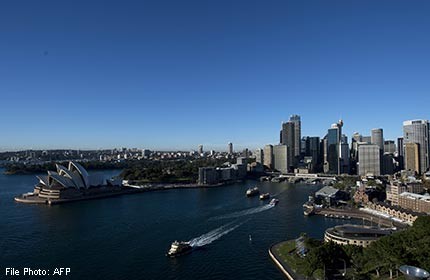Australia 'will continue to grow'

AUSTRALIA - Australia, rare among developed economies for escaping a recession for more than two decades, will continue to expand despite sharply sliding manufacturing.
That is the word from its Trade and Industry Minister.
"We should be able to do it if we pursue aggressively the agenda we have in mind for fundamental domestic reforms," Mr Andrew Robb told The Straits Times in an interview.
Australian manufacturing, hurt by slowing productivity gains, rising wage costs and a limited home market, has been on a steady decline for years.
Toyota, Ford and General Motors have all announced plans to stop making cars in Australia, putting at risk some 50,000 jobs at their plants, and those of component-makers. The mining boom has waned as demand slackens in key markets such as China.
Alongside all that, a strong Aussie dollar, currently converting at 90 US cents, has impacted education and tourism, also key revenue earners. That has led some analysts to wonder if the US$1.6 trillion (S$2 trillion) economy could see its first recession in 23 years.
"If we could get the Aussie dollar down to about 85 US cents, or less, it will help stabilise our situation and make us more competitive," Mr Robb said. "That said, the currency's strength has put us in a stronger position for the way forward."
That forward path, as conceived by Mr Tony Abbott's Liberal government that took power last September, involves a series of moves.
For one thing, the Liberals are pushing to put government accounts, now bloated by A$660 billion (S$751 billion) in public debt, back in the black.
Another is massive deregulation.
"In the last seven years of Labor governments, there has been a net addition of 21,000 regulations. We are going to remove 8,000 of them on our first Deregulation Day next month, and in another few months, there will be another Repeal Day," he said.
There also will be a drive to cut both red and "green" tape, he added, referring to environmental concerns that have blocked or delayed investments, some for as long as six years.
Since September, Australia has cleared 171 such projects. Should the country get its competitiveness right, says the Abbott government, it should be able to attract most of the US$250 billion of resources and energy projects under consideration worldwide.
It will also be well-positioned to take advantage of the middle-class explosion that is poised to sweep Asia over the next 30 years, particularly in large states such as India and China.
Companies such as auto component-makers may also need to endure some pain as they retool and move up the manufacturing value chain to make parts for high-value customers such as aircraft-makers.
"The risk to me would come if we stopped reforming," Mr Robb said. "In any business, if you stay still, you get run over."
The Abbott government has been under fire from Sir Richard Branson, the aviation mogul, over reports that it might intervene to shore up national airline Qantas, which is suffering from poor yields and eroding market power.
"We haven't made a decision," Mr Robb said, indicating that the government would not intervene in a hurry. "We have asked Qantas to clarify its position."
He suggested that one way to help Qantas would be to help lift a cap on foreign ownership, but that would need Senate approval, which may not be forthcoming.
"Qantas is a significant part of our infrastructure and a brand that is second to none," he said.
velloor@sph.com.sg

Get a copy of The Straits Times or go to straitstimes.com for more stories.